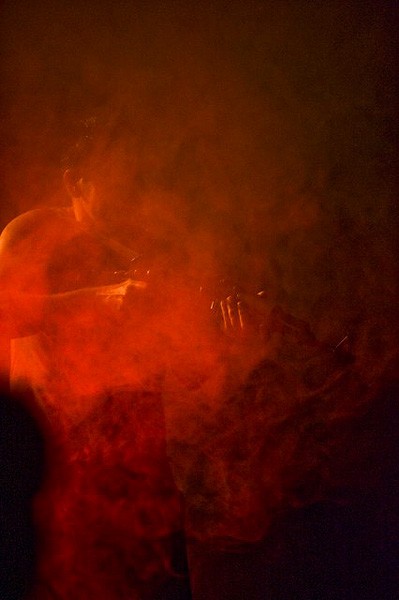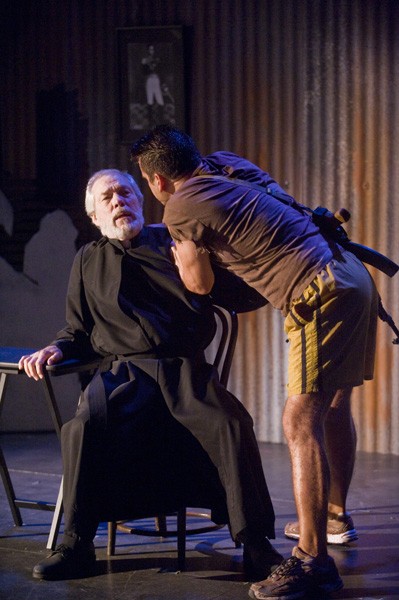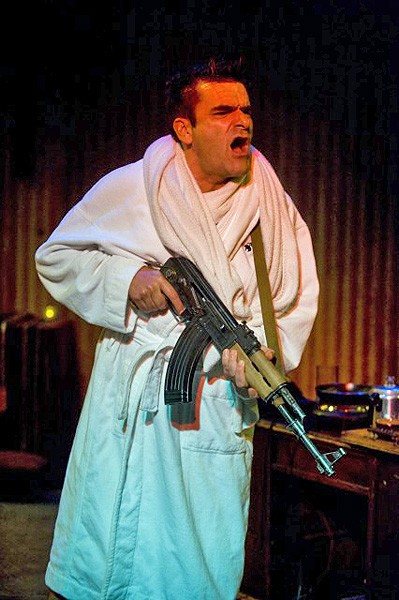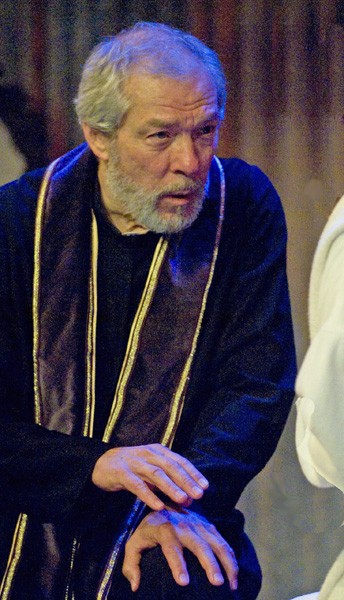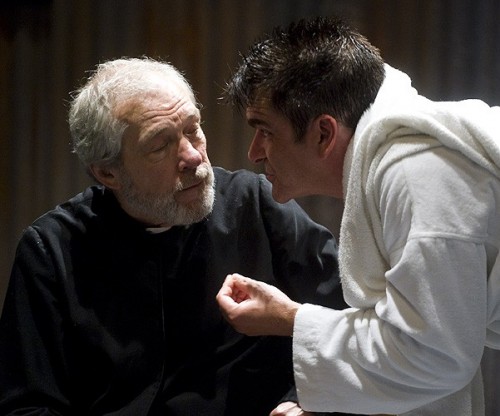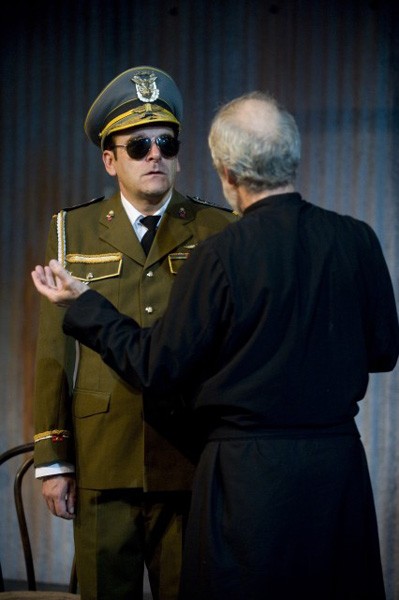Donald Freed's Devil's Advocate at Shakespeare & Company
The Political Histrionics Have Begun
By: Larry Murray - Aug 03, 2009
Shakespeare & Company present Devil's Advocate, a play by Donald Freed, Lighting Designer - Greg Solomon, Costume Designer - Jim Day, Sound Designer - Michael Pfeiffer, Stage Manager - Molly Hennighausen, Directed by Dee Evans and Clare Reidy. Cast: Ignatius Anthony as Manuel Antonio Noriega; Dennis Krausnick as Archbishop Jose Sebastian Laboa. July 30 - august 16 at the Elayne P. Bernstein Theatre, Lenox MA. About 90 minutes with no intermission. http://www.shakespeare.org/
Following the opening night performance of Devil's Advocate at Shakespeare & Company, one of the questions in the air was why this play was chosen to open their "Life Laid Bare" series. The company describes this series of three works as "cutting edge plays of social and political significance." But this play is hardly new, or cutting edge at all. It is in fact a thinly disguised polemic, a screed, rehashing old paranoid political theories about George H.W. Bush and his decision to invade Panama and remove its leader, Manuel Noriega from power. It is written by Donald Freed, a bit of a political maverick himself.Freed is scheduled to arrive at the Lenox campus of Shakespeare & Company midweek to present his newest work, Hamlet in Rehearsal. The reading, slated for Wednesday August 5 at 1 PM is free.
Freed's schtick is taking historic political events and re-imagining them in a theatrical context. Harold Pinter calls his work a "unique and fearless marriage of politics and art." I say it is poppycock.
That does not prevent it from being interesting or even stimulating theater, fair enough reason to kick off the new series with this play. But there are some interesting possibilities here. Freed has also written plays about Nixon, and George W. Bush and perhaps this is a trial run in order to convince the playwright to allow the feisty Lenox-based company to perform them. Manuel Noriega and the first President Bush may be old news, but a play about the most recent Bush would sell a lot of tickets, no matter how far fetched the story might be. There is little that could top the actual history of the man, his two terms in the White House manufactured fiction every day.
When asked about the play, Freed explained how it came about. "When the Anglo-American producer Barry Spikings, the American director Robert Altman, and I first met to discuss this project — the hunt and capture of the Panamanian 'monster' Manuel Noriega by the Vatican's 'Devil's Advocate' and 'Grand Inquisitor' Archbishop LaBoa — I sensed that the play would have to take the audience down in to the Hell of modern, superpower colonialism. That has proved to be the case," said Freed.
Devils Advocate is set in 1989 and features Ignatius Anthony as Noriega and Dennis Krausnick as Archbishop Laboa. Their performances are absolutely brilliant, even if they don't make sense at times. Freed may be our most political playwright, but he is no master of continuity.
When the play opens, Noriega is seen fleeing the American forces in a brilliant sound and light scene that effectively simulates gunfire, a helicopter chase, panic and pandemonium. At the same time we see the Archbishop kneeling in his chapel, deep in prayer, obviously a sick man. He is coughing, and weak, and his first words upon seeing Noriega enter the Vatican Embassy is a plea for the dictator to help him up from his kneeling position.
Throughout the play we see the priest collapsing, fainting, and otherwise showing the ravages of age and disease. Yet this is completely reversed, sometimes in a matter of seconds, into a virile, healthy, strong character who is cooking, dressing the General, and delivering speeches at the top of his voice. Sick. Well, Strong. Weak. No continuity. It is one thing to suspend disbelief when entering a theater, but here you have to do it twice. All the events take place on a single evening, and so these rapid recoveries and relapses simply make no sense. That Dennis Krausnick is nevertheless able to make us believe this is happening - illogical as these swings in health are - is a credit to his acting.
As Noriega, Ignatious Anthony arrives barely clothed and leaves in full Military regalia. Between these two extremes, the playwright almost strips him naked, and then rebuilds him in his own theatrical image. But in constructing this play, Freed turns the concept of advocatus diaboli on its head. Noriega is no saint nearing canonization, rather he is an evil man in whom the Bishop tries to find good, to excuse the excesses of power by becoming an advocatus angelus.
To give credit to Freed, there is a case to be made that America's support of Noriega for many years before he became an enemy has remarkable parallels to the rise and fall of Saddam Hussein for crimes originally supported by the U.S. From those truths, this play can certainly spark some worthwhile discussions.
Using minimal props and scenery, the playing area is greatly enlarged and enhanced by the clever use of lights and sound throughout the show. In fact it is amazing what these normally overlooked crafts contribute to the theatricality of the production. Whether it is the magenta coloring of a darkened room, or the blast of rock and roll from unseen speakers - part of the psychological warfare (and nonsense) of the era - it is clear that the armed forces are never far away, keeping the tension of the play at a high level. Walking around with a gun also accomplishes the same thing. It is an old playwright's trick.
In the macho world of war, warriors and weapons, it seems downright contradictory that many of the anti-intellectual crowd who hate the arts but enjoy a little death and torture in their daily routine turn not to sports analogies, but to theatrical metaphors to describe the act of killing each other. For example, WW II was divided into the European and Pacific "theaters" of war. The ground, air and sea forces are assembled like giant casts, and the battle plans are devised like the scenarios of a play. Many "surprise" attacks are devised, complete with the same convenient decoys and false leads that Anthony Shaffer (Sleuth) or Agatha Christie (The Mousetrap) use in their plays.
Dramatizing historic events requires a great deal of imagination to fill in the many blanks. History is, after all, written by the winners, and rarely reflects the absolute truth to begin with. So it is not unexpected that a play about Bush and Noriega might have many fictional elements. Devil's Advocate is a duel of wills between the dictator and the priest in which they lock horns as he seeks asylum in the Vatican Embassy for one night, refusing to surrender to the American forces outside its gates. Dee Evans who directed the play for the Edinburgh Festival in 2006 to good notices, also directs it here . She worked with Shakespeare & Company in the seventies, which is said to have been her inspiration to help form the Mercury Theatre Company in the U.K. where she is Artistic Director.
She succeeds in fashioning a compelling evening of theater out of Freed's script. Unfortunately, Devil's Advocate seems to try to portray Noriega as a simple, backward boy who was used and corrupted by the all powerful American CIA. Freed tries to make us feel sympathy for him, to see him as the victim, and not the despicable human being he was. He fails in that regard. For all the rationalization, there was no sympathy generated. On the other hand, the play does hit the nail on the head in several areas, one of which is the increasing pomposity behind the names these events carry. The Panama invasion was called Operation Just Cause.
Once war games carried colorful names like Operation Vittles (The 1948 Berlin Airlift) or Operation Frequent Wind (The 1975 evacuation of Saigon). But names like Operation Just Cause and the recent Operation Enduring Freedom are just propaganda tools, and transparent ones at that.
If you enjoy politics and propaganda, this play will be endlessly fascinating. It portrays Gneral Noriega and Archbishop Laboa as larger than life characters. They believe they are nothing more than pawns in a chess game being played by America's CIA, they do it in the most dramatic terms possible, making for a brilliant evening of theatre, if not truth.
The battle of words continues.
Next up is John Patrick Shanley's 1985 play The Dreamer Examines His Pillow (August 7- September 6) which examines the nature of black relationships. This will be followed by J.T. Rogers' 2000 play, White People (August 21-September 4) in which three people deal with horrible events and the racial issues they raise.
In the choice of the three plays in its "Life Laid Bare" series, Shakespeare & Company is playing with theatrical fire. It remains to be seen if these incendiary plays set the public ablaze. The constant drumbeat of unrelenting bad news on television has numbed public interest in politics to a great extent. So Shakespeare & Company is to be commended for trying to stimulate more pubic participation and discussion in hot button topics. And there's always the chance that they will start a conflagration they can't put out.
No wonder Tina Packer and her company make a big deal out of reading the Declaration of Independence every July 4. For them it is not simple patriotism, it is something more, it is their license, and their duty, to provoke.

